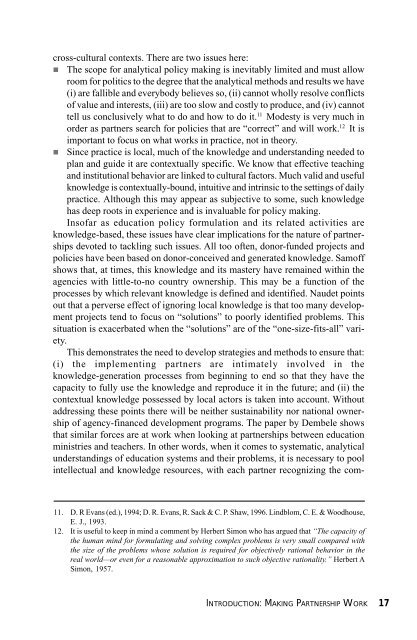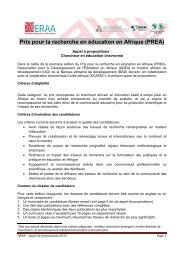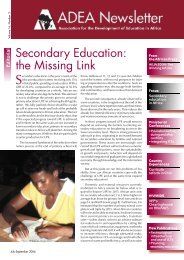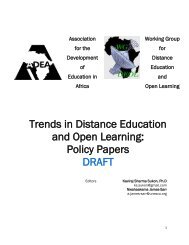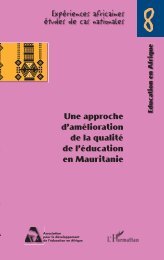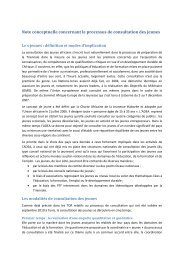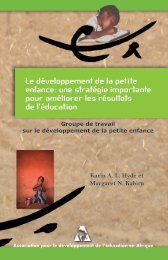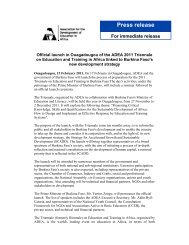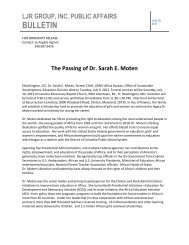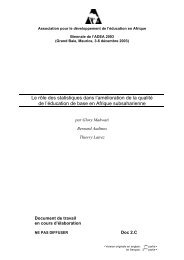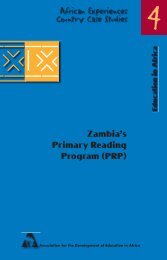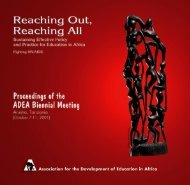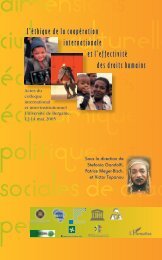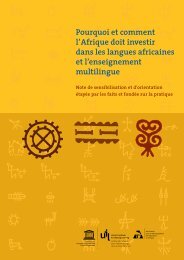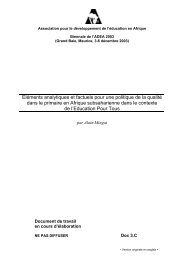Partnerships for Capacity Building and Quality ... - ADEA
Partnerships for Capacity Building and Quality ... - ADEA
Partnerships for Capacity Building and Quality ... - ADEA
You also want an ePaper? Increase the reach of your titles
YUMPU automatically turns print PDFs into web optimized ePapers that Google loves.
cross-cultural contexts. There are two issues here:! The scope <strong>for</strong> analytical policy making is inevitably limited <strong>and</strong> must allowroom <strong>for</strong> politics to the degree that the analytical methods <strong>and</strong> results we have(i) are fallible <strong>and</strong> everybody believes so, (ii) cannot wholly resolve conflictsof value <strong>and</strong> interests, (iii) are too slow <strong>and</strong> costly to produce, <strong>and</strong> (iv) cannottell us conclusively what to do <strong>and</strong> how to do it. 11 Modesty is very much inorder as partners search <strong>for</strong> policies that are “correct” <strong>and</strong> will work. 12 It isimportant to focus on what works in practice, not in theory.! Since practice is local, much of the knowledge <strong>and</strong> underst<strong>and</strong>ing needed toplan <strong>and</strong> guide it are contextually specific. We know that effective teaching<strong>and</strong> institutional behavior are linked to cultural factors. Much valid <strong>and</strong> usefulknowledge is contextually-bound, intuitive <strong>and</strong> intrinsic to the settings of dailypractice. Although this may appear as subjective to some, such knowledgehas deep roots in experience <strong>and</strong> is invaluable <strong>for</strong> policy making.Insofar as education policy <strong>for</strong>mulation <strong>and</strong> its related activities areknowledge-based, these issues have clear implications <strong>for</strong> the nature of partnershipsdevoted to tackling such issues. All too often, donor-funded projects <strong>and</strong>policies have been based on donor-conceived <strong>and</strong> generated knowledge. Samoffshows that, at times, this knowledge <strong>and</strong> its mastery have remained within theagencies with little-to-no country ownership. This may be a function of theprocesses by which relevant knowledge is defined <strong>and</strong> identified. Naudet pointsout that a perverse effect of ignoring local knowledge is that too many developmentprojects tend to focus on “solutions” to poorly identified problems. Thissituation is exacerbated when the “solutions” are of the “one-size-fits-all” variety.This demonstrates the need to develop strategies <strong>and</strong> methods to ensure that:(i) the implementing partners are intimately involved in theknowledge-generation processes from beginning to end so that they have thecapacity to fully use the knowledge <strong>and</strong> reproduce it in the future; <strong>and</strong> (ii) thecontextual knowledge possessed by local actors is taken into account. Withoutaddressing these points there will be neither sustainability nor national ownershipof agency-financed development programs. The paper by Dembele showsthat similar <strong>for</strong>ces are at work when looking at partnerships between educationministries <strong>and</strong> teachers. In other words, when it comes to systematic, analyticalunderst<strong>and</strong>ings of education systems <strong>and</strong> their problems, it is necessary to poolintellectual <strong>and</strong> knowledge resources, with each partner recognizing the com-11. D. R Evans (ed.), 1994; D. R. Evans, R. Sack & C. P. Shaw, 1996. Lindblom, C. E. & Woodhouse,E. J., 1993.12. It is useful to keep in mind a comment by Herbert Simon who has argued that “The capacity ofthe human mind <strong>for</strong> <strong>for</strong>mulating <strong>and</strong> solving complex problems is very small compared withthe size of the problems whose solution is required <strong>for</strong> objectively rational behavior in thereal world—or even <strong>for</strong> a reasonable approximation to such objective rationality.” Herbert ASimon, 1957.INTRODUCTION: MAKING PARTNERSHIP WORK 17


